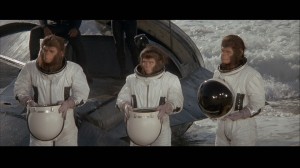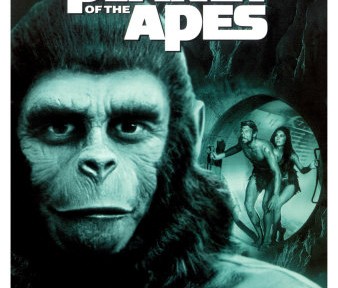The double feature does not represent a long night at the home video screen but rather last week’s and this week’s Sunday Night Movie feature combined into a single essay.
After watching 1968’s Planet of The Apes the idea struck me that I should watch all five of the original Ape movies in order. A coupe of years ago I scored a blu-ray box set that had all the films and tons of bonus feature, so logistically I saw no issues. That said I knew that meant I would be watching the crap with the imaginative. Oh well, I decided to do it.
 Beneath the Planet of the Apes is the hastily consider sequel to 1968’s smash box-office success Planet of the Apes. However due to financial troubles at 20th Century Fox and boardroom infighting the film suffered from a trouble production from the get-go. Heston, the star of the first film hated the very idea of any sequel and only reluctantly agreed to participate as a favor to Daryl Zanuck, but even this came at the price with Heston insisting that his character of Taylor — spoiler alert stop reading if you care, serious stop reading — be killed off in the story.
Beneath the Planet of the Apes is the hastily consider sequel to 1968’s smash box-office success Planet of the Apes. However due to financial troubles at 20th Century Fox and boardroom infighting the film suffered from a trouble production from the get-go. Heston, the star of the first film hated the very idea of any sequel and only reluctantly agreed to participate as a favor to Daryl Zanuck, but even this came at the price with Heston insisting that his character of Taylor — spoiler alert stop reading if you care, serious stop reading — be killed off in the story.
The plot of Beneath is one that makes little to no sense. Another crew has been dispatched following Taylor’s into space. Now Taylor’s team knew that they were on a one-way trip into the future, proving Dr. Hasslien’s theories. In this film Brent (James Franciscus) and his crew have been dispatched to find Taylor. (Apparently Landon, Dodge, and Stewart were utter berks and no one wants them back,) Brent crashes, and has a much abbreviated repeat adventure of Taylor’s first encounter with ape society. Escaping the apes, he and the mute animal/human Nova go into the forbidden zone searching for Taylor. They find mutant humans with psychic powers who are at war with the Apes. (First appearance of the Producer’s wife as the mutant Albina.) Taylor and Brent find each other, have a manly fight (thanks, mutants!) and then are caught there when the Ape army arrives. Everyone panics, there’s lot of gunfire, and a nuclear device that is over 2000 years proves that there is no beating American manufacturing when it goes off and destroys the world.
This film was a hit. It practically relaunched the idea of major studio, major money sequel. Except for the Universal horror franchises, series films before Beneath were usually constructed like episodes, each film could be watched on its own and did not effect the continuity of other films. After the major success of Beneath, film sequels were seen not as episodes but a continuation of the same story. Quite a change.
 I can clearly remember seeing Escape from the Planet of the Apes at the Sunrise Theater in Fort Pierce Florida. That was 1971 so I would have been 10 years old, and I remember laughing a full belly laugh as the ‘unmasking’ scene at the film’s open. Escape faced the challenge of crafting a continuation of the story when in the pervious film not only did your principle characters get killed, but the entire freakin’ world was turned to ash as a gravely toned narrator informed the audience that the world was now dead.
I can clearly remember seeing Escape from the Planet of the Apes at the Sunrise Theater in Fort Pierce Florida. That was 1971 so I would have been 10 years old, and I remember laughing a full belly laugh as the ‘unmasking’ scene at the film’s open. Escape faced the challenge of crafting a continuation of the story when in the pervious film not only did your principle characters get killed, but the entire freakin’ world was turned to ash as a gravely toned narrator informed the audience that the world was now dead.
Hollywood turned to the now familiar trope, time travel. Thee apes, apes that in the first film believed flight to be a physical impossibility, have figured out the operation of an advanced spacecraft repaired it, launched it, and through a freak incident are thrown back in time to 1973. So instead of a story about men on a planet of apes, it is a story of apes stranded on a world of fearful humans. While there are a number of comical bits, this film does plumb interesting depths. What actions are morally justified to prevent a terrible future from coming into reality? What is the place of the outsider?
Something I only noticed on this viewing is the continuity of a secondary character. In Planet of the Apes the flight is done in part to prove Dr Hasslein’s theories, but not much more than that is mentioned of the good doctor. (Clearly a script stand-in for relativity and Einstein.) Beneath mentioned the good doctor not at all, but in Escape he is a principle character. (Played wonderfully by Eric Braeden, who also star in another 70’s SF film in my library, Colossus: The Forbin Project.)
The ape time-travelers quickly transit from curiosities, to celebrities, and into hunted fugitives. Though they find allies, second appearance of the producer’s while as a kind and sympathetic vet, in the end there are more enemies than friends. Like so often in film of the 1970’s it ends darkly, but the producers this time left themselves a thread for another film and this upcoming Sunday I’ll watch Conquest of the Planet of the Apes.

